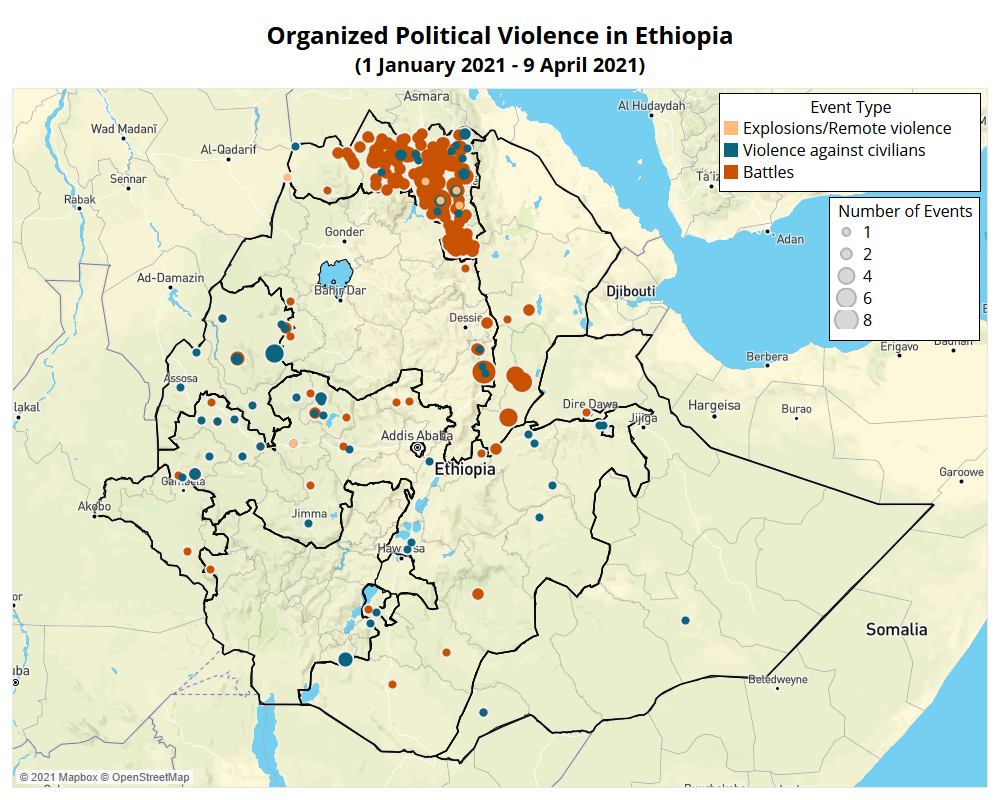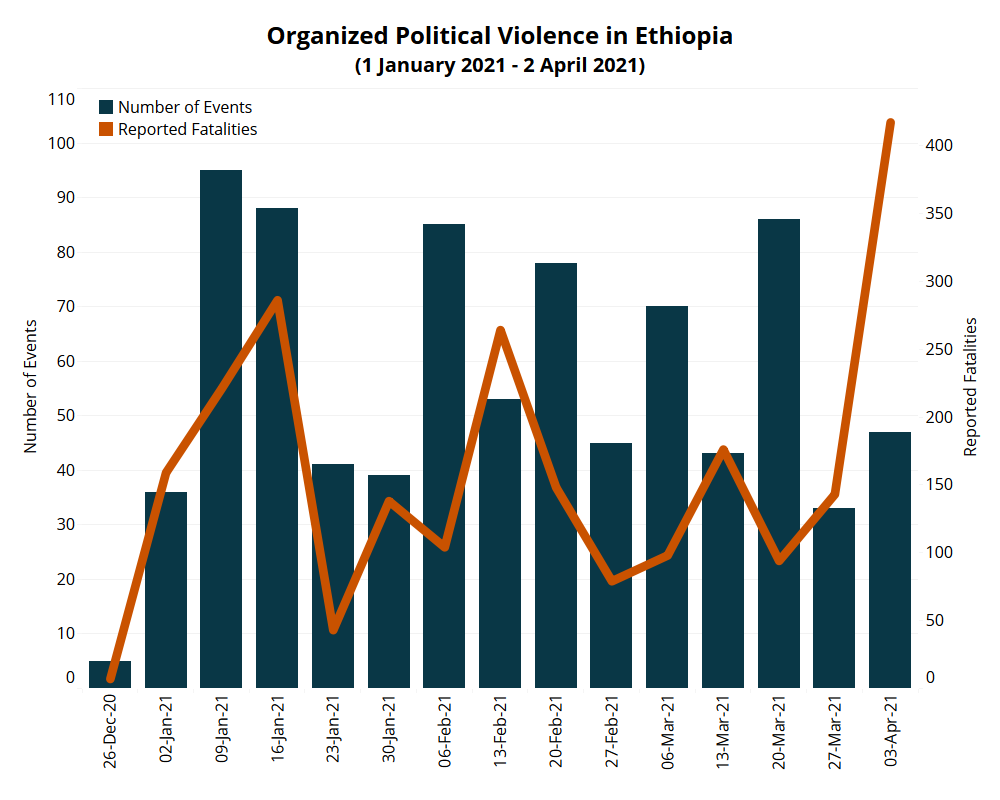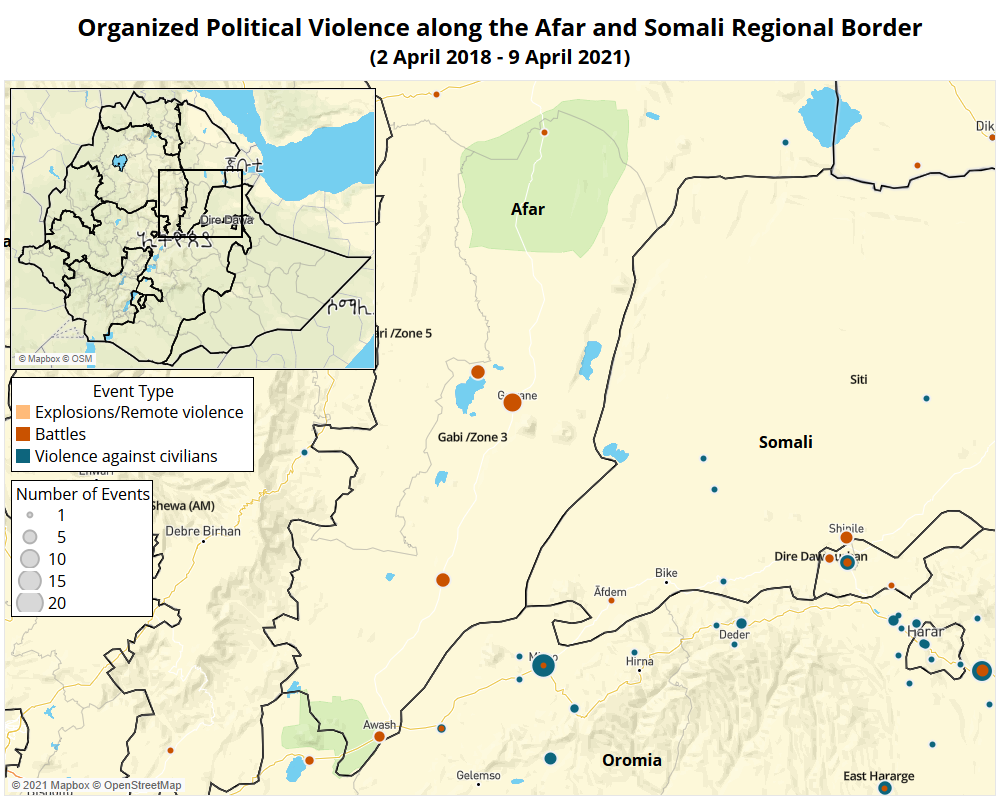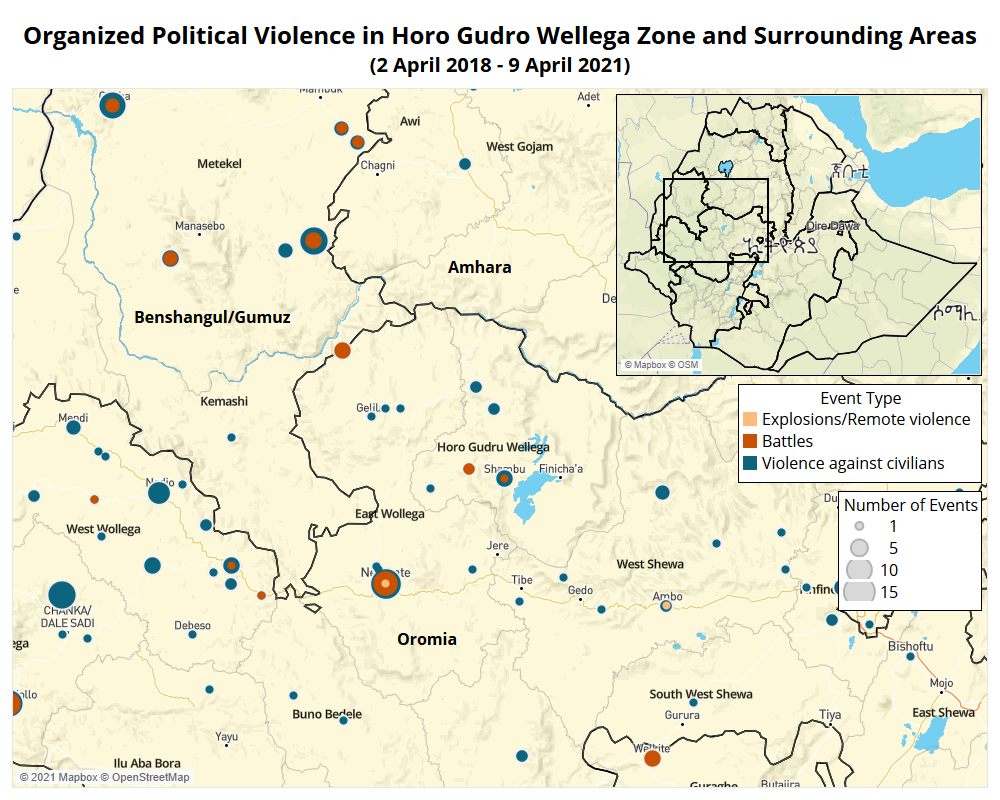By the Numbers: Ethiopia, 2 April 2018-9 April 20211Figures reflect violent events reported since Prime Minister Abiy Ahmed came to power on 2 April 2018.
- Total number of organized violence events: 1,439
- Total number of reported fatalities from organized violence: 6,505
- Total number of reported fatalities from civilian targeting: 3,746
Ethiopia data are available through a curated EPO data file as well as the main ACLED export tool.

Situation Summary
Fighting intensified throughout the beginning of last week (from 2- 7 April 2021) in areas of contested territory between Somali and Afar regional states, resulting in an estimated 100 fatalities. Clashes involved mostly local militia actors, but the regional special forces from both Somali and Afar regions were also involved in supporting the local militias. Meanwhile, clashes in western Oromia between the Oromo Liberation Front (OLF)-Shane and federal forces increased in multiple locations throughout the Horo Guduro Wollega Zone. Ethnic Amhara civilians in the Horo Guduro Wollega Zone and other zones across western Oromia have been displaced after heavy fighting between communities and attacks on civilians perpetrated by the OLF-Shane. Moreover, clashes related to self-determination within the SNNPR are challenging the region’s peace and security (see graph below for organized political violence in Ethiopia between 1 January-9 April 2021).
In Tigray, there has been a general decrease in hostilities throughout March and into April. Contests for control of the rural areas outside of main cities and roads have decreased as the Tigray Defense Force (TDF) continues a strategy of insurgent attacks that move and engage rather than attempting to hold territory.
Furthermore, as the sixth general election approaches on 5 June 2021, election-related disputes and violence are becoming frequent. Last week, in addition to the intense Somali-Afar clashes triggered by the election constituency designation, a candidate of the National Movement of Amhara (NaMA) party in the Metekel Zone of Benshangul/Gumuz region was assassinated.

Tigray Conflict Update
In Tigray, violence levels have generally decreased throughout the months of March and April. This is a result of strategy shifts by the Tigray Defense Force (TDF), who have stopped attempting to hold territory and have instead begun engaging in roving hit-and-run attacks. Despite a relative decrease in territorial conflicts that occurred earlier in Tigray’s Central and Eastern Zones, civilians are still routinely falling victim to violent attacks by TDF. On 8 April 2021, TPLF associated forces reportedly ambushed a convoy traveling between Adwa and Tembien towns (Central Zone), killing an unspecified number of civilians (EBC, 8 April 2021). Reports indicate that at least 33 civilians were killed by Ethiopian Defense Force soldiers in Selekleka town, North Tigray, with hundreds taken hostage and then released.
There are reports of Eritrean forces leaving Ethiopia, although it is clear that they are still present in large numbers in Tigray’s Central Zone. Currently, the most active conflict between TPLF associated militias and the federal government forces is occurring in South and South Eastern Zones respectively.
Regional Focus: The Afar-Somali Regional Conflict
Last week, clashes along disputed territory on 2 April and 6 April 2021 in areas between the Afar and Somali regional states resulted in an estimated 100 fatalities (BBC, 6 April 2021; Al Jazeera, 7 April 2021). As the conflict has intensified, so too has the dialogue between warring parties who each accuse the other of instigating the violence (VOA, 6 April 2021; Somali Communications, 6 April 2021; DW Amharic, 7 April 2021). The Afar regional state Communication Office stated that soldiers from the Somali regional state special forces attacked Hanruk, Gelano, and Gewane Woredas on 2 April and 6 April 2021. On the other hand, the Somali regional state Communication Office stated that on 2 and 6 April 2021, the Afar region special forces, along with other militias (called Uguguma “ኡጉጉማ“), attacked civilians in Deawdi, Kerefa, Deawdid, Gewrean, Kelale, and Denlehe Kebeles.
Tensions erupted between the two regional states after the National Electoral Board of Ethiopia (NEBE) listed 30 polling stations in these three areas under the Somali regional state. When the Afar regional state disputed the designation of these decision 30 polling stations under the Somali regional state (Ethiopian Reporter, 21 March 2021), NEBE decided to cancel the disputed 30 polling stations and instead advised residents in the contested areas to register and vote in neighboring Kebeles (NEBE, 24 March 2021). The Somali regional government rejected NEBE’s decision and warned of the “difficulties of participating in the upcoming election” if these polling stations remain closed (Somali Communications, 25 March 2021).
To resolve the conflict, the Ministry of Peace invited both parties with participants from the country’s peace and security institutions for dialogue on 8 April 2021. Presidents of both regions attended the dialogue conference with their delegations. At the end of their discussion, both parties agreed to stop the violence, retreat their special forces to their borders, and to respect and abide by previous agreements. They also agreed to allow the federal government to investigate the latest round of conflict in order to identify the perpetrators of the recent clash (Ministry of Peace, 8 April 2021).
The area in focus has frequently had violent conflict between agents from Somali and Afar regional states (see map below). In February 2021, ACLED documented three incidents between the Afar and Somali militias in Mile, Adaar, and Amibera Woredas of the Afar regional state. Intense violence in 2019 left more than 30 people dead in the same area.

Election-Related Disputes and Violence
In the pre-election period, several electoral disputes have led to violence. Last week, a candidate of the National Movement of Amhara (NaMA), who was competing for the state council of Benshangul/Gumuz in Wonbera Woreda, Metekel Zone, was killed in the Karbar area of Metekel Zone (National Movement of Amhara, 9 April 2021). NaMA is an Amhara nationalist party with the objective of defending the interests of the Amhara ethnic group, both in the Amhara region and outside the Amhara region. Over the past year, Metekel zone has been one of the most violent areas in the country with most fatalities being linked to attacks by unspecified ethnic militias on ethnic Amhara civilians (for more details See EPO’s Metekel conflict page). Since NaMA’s party platform advocates for the interests of ethnic Amharas, the assassination of the candidate in Metekel is likely an attempt to deter the party’s participation in the upcoming election in the region.
Furthermore, the Harari regional state government’s request for the Harari people who do not reside in the region to cast their vote to the Harari state council was declined by NEBE. Even though the Harari regional state government presented the election practice of Ethiopia’s previous five general elections as evidence, NEBE declined the request based on lack of support from the constitution and other electoral rules (NEBE, 9 April 2021).
Other Regions
Southern Nations, Nationalities and Peoples Region (SNNPR)
Clashes related to the question of self-determination within the SNNPR are challenging the region’s peace and security. Around 7 April 2021, 12 civilians were killed and eight injured in attacks by militias associated with the Gumayde Peoples Special Woreda Return Committee in Bunit, Alfacho, and Abulo Kebeles of Amaro Woreda, Segen Area People’s Zone. More than 11,000 ethnic Koore were reported to be internally displaced following the attacks (Addis Standard, 8 April 2021).
Oromia Region
Clashes between the OLF-Shane militants and federal forces took place in Kuyu and Dagem Woredas of North Shewa, Oromia, as well as Abe Dongoro and Kombulcha Woredas of Horo Guduro (see map below). Government sources have indicated that they have killed 14 OLF-Shane militants and arrested 143 additional fighters in Kuyu and Dagem Woredas of North Shewa, Oromia region (EBC, 10 April 2021; DW Amharic 12 April 2021).

Around 7 April 2021, clashes between OLF-Shane militants and federal forces were reported in Abe Dongoro, (Horo Guduro, Oromia), and 39 OLF-Shane militants were killed while in rural areas surrounding Kombulcha (Horo Guduro, Oromia). An unspecified number of soldiers were killed. Due to the violence, hundreds of families were reportedly displaced into the Kombulcha town.
Moreover, this week OLF-Shane killed more than 20 civilians, mostly ethnic Amharas, in Oromia region. On 5 April 2021, suspected OLF-Shane militants attacked Amhara residents in Bila and Gudoro Woredas and killed 12 civilians. On 6 April 2021, OLF-Shane militants attacked communities in Mender area of Abe Dongoro (Horo Guduro Wollega, Oromia), killing three communal militia members and three civilians. Sources also indicated that local militias killed two OLF-Shane members in response (VOA, 7 April 2021). On the same day, OLF-Shane militants killed six civilians in East Wollega. In addition, last week it was reported that around 15 March 2021 (month of), OLF-Shane militants reportedly intercepted a technical team sent to fix the electrical lines in Anfillo (West Wollega, Oromia), setting fire to their vehicles and beating them before releasing them after three days.
Between 2 and 4 April 2021, ten staff members at Jimma university were arrested on the grounds of attempting a coup and supporting the Oromo Liberation Army (OLA) (Addis Standard, 8 April 2020).
Benshangul/Gumuz Region
On 6 April 2021, federal forces stationed in Metekel Zone, Benshangul/Gumuz region reportedly killed 15 unidentified armed men who were involved in recent attacks on civilians in Mandera, Metekel Zone, Benshangul/Gumuz region and Jawi, Awi Zone, Amhara region (DW Amharic, 6 April 2021)
Amhara Region
The previous EPO Weekly reported on clashes between Oromo and Amhara communities in the Oromo Zone of Amhara region and surrounding towns, with gunshots recorded in Majete, Ataye, and Dumuga towns. On 4 April 2021, 12 ethnic Oromo militants who had been wounded during clashes in Ataye were dragged out of an ambulance vehicle and killed by rioters in Shewa Robit town (North Wollo, Amhara).






